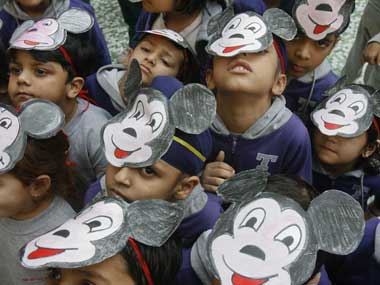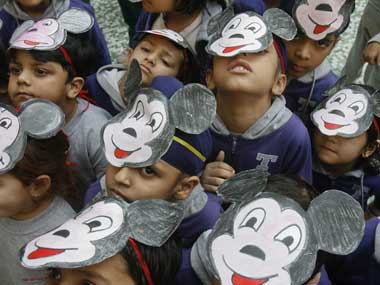New Delhi: The suspense over the Delhi High Court judgment on nursery admissions continued into the second week with the Centre continuing to dither on making its stand clear on whether the Right to Education (RTE) Act applies to nursery or pre-school. After a marathon hearing of final arguments, the High Court had reserved its judgment on 30 January. While the Minister of State for Human Resource Development Shashi Tharoor had in a recent media interview said that the RTE Act did not apply to nursery admissions, the Centre is yet to inform the High Court of its stand on the scope of the RTE Act, forcing the court to call a hearing. Apologising for holding up the judgment, the government counsel told the court that as of yesterday (11 February) the opinion of the law ministry had been sought and requested the court to grant it time till tomorrow (13 February to submit its response. [caption id=“attachment_622586” align=“alignleft” width=“380”]  Reuters[/caption] Expressing its keenness to know where the government stands, the court said, “Without the stand of the government we can issue the judgment. But we don’t want to do that. We want to know what the definite stand of the government is.” The High Court is hearing a writ petition filed by NGO Social Jurist that has challenged notifications issued by the Centre and the Delhi Government that allowed private unaided schools to come up with their own criteria for nursery admissions. The result - where schools allot points to categories such as sibling and alumni and admit students based on the points they earn – the petition states is a violation of the RTE Act which prohibits any sort of screening procedure that discriminates between children. However, the RTE Act’s definition of a child as being 6 to 14 years has revived the question of the scope of the Act and its applicability to nursery where children are below 6 years. Seeking the government’s clarification on what regulates nursery admissions in the event that the RTE Act does not apply to it, the court said, “Suppose we take the stand that the Act does not apply to nursery or pre-school, then how are you going to regulate nursery admissions? We have been informed that here in Delhi all admissions are made at nursery stage and admission to class 1 is automatic. If that interpretation is given, then what will happen? Then all this screening procedure, capitation fee, cannot be implemented at class 1 admission. Therefore, naturally, those provisions cannot be implemented at all.” (The court presumably referring to provisions in the RTE Act that prohibits screening procedures.) Ashok Agarwal, advocate representing Social Jurist, makes the case that if “pre-primary classes are not covered by the provisions of the RTE Act, it would lead to an anomalous situation where children are admitted in pre-primary classes by subjecting them to a screening procedure and thereafter promoting them to higher classes. A six-year old child so promoted to Class I would have already been screened at the pre-primary level and, therefore, the prohibition contained in Section 13 of the Act against screening would completely lose its meaning.” Giving the government one more day, the Court has asked it to respond on two specific questions: Whether the Act is applicable to nursery school? And two, if it is not applicable, what is the procedure to be followed for nursery admissions?
The RTE Act’s definition of a child as being 6 to 14 years has revived the question of the scope of the Act and its applicability to nursery where children are below 6 years.
Advertisement
End of Article


)
)
)
)
)
)
)
)
)



